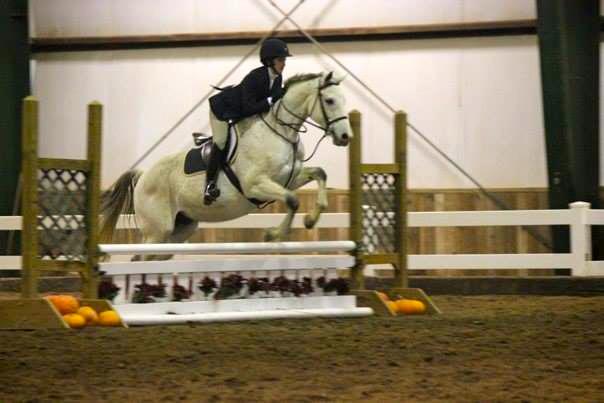Young Riders Bolster Equestrian Roster
Junior captain Caitlyn Pineault and her horse bound over hurdles in the novice level bracket at Stonegate Farm during a competition earlier this year. The equestrian team will resume practice and competition in the spring.
December 5, 2014
Since its founding in the 1980s, the Oberlin College Equestrian Team has established itself as one of the most popular club sport teams on campus, offering students the unique opportunity to take part in horseback riding near Oberlin’s campus.
The horses ridden by the team are housed approximately one mile north of campus at the Equine Differences Barn, a lesson facility that the team’s head coach Ric Weitzel and his wife Julia Balint-Weitzel established in 2003. The close proximity of the barn to campus is advantageous to the team.
“It’s very convenient having the barn only a mile away,” said Weitzel. “For most collegiate programs, you have to travel maybe 40 minutes to get to the facility, which can be cost-prohibitive.”
While horse showing is a very expensive sport, according to Weitzel, the College subsidizes the team by paying for competition entry fees and travel expenses in order to make OCET more accessible for students.
“This is something that’s unique to Oberlin College — the ability to walk on and have everything paid for,” said Weitzel.
Students on the team have access to the barn’s 22 horses and can participate regardless of their time commitment to the team. Though members have to pay for lessons out of pocket, junior team captain Caitlyn Pineault said that these lessons are inexpensive in comparison to other facilities, with a price tag of $35 per person for a group lesson.
Members also have the option of competing in the Intercollegiate Horse Show Association. According to Pineault, about 10 Oberlin students regularly attend the five show weekends that take place each semester. Fourteen schools in the Northern Ohio and Western Pennsylvania regions participate in these weekends, as well.
IHSA competitions and Weitzel’s training program offer both English and Western showing options. The versatile array of training styles allows the team to sample different techniques and compete in a variety of events.
“The sport and team are very flexible,” said junior Anna Greenberg. “You can ride English, dressage, Western or any combination of the disciplines.”
Though the team hasn’t seen a great deal of success, individual riders on the team have earned many accolades.
“I’m most proud of participating in my first horse show this past month,” said Greenberg. “I even placed and got a ribbon to bring home, which was awesome. I’m super pumped to go to other shows and maybe bring home some more ribbons.”
According to Pineault, increased membership has also helped the team become more competitive this semester. During its showing at Lake Erie College, the team placed third of 12 competing teams.
“We had riders in four out of the six divisions, and usually we only have riders in two or three divisions,” said Pineault.
Pineault is optimistic about the future of the team, given the number of first-years involved.
“It’s always fun bringing freshmen to their first meet because even if they’ve showed before, IHSA is a different animal.”
One challenge the team faces, and one that Pineault said might contribute to the team’s lack of a presence on campus, is fostering team cohesion in small lesson groups and optional shows.
“We can’t fit all 25 people on the team into one lesson, so lessons are between two and four people,” she said. “You get to know your lesson-mates really well, but you kind of lose the sense of team that other club sports have when they all practice together.”
Although the team does not often meet as a complete unit, individual members do have the opportunity to create meaningful relationships with their horses.
“The care of the animals is probably the most rewarding and unique thing,” said Weitzel. “You have an equine partner that you have to compete with. You have to learn how to read and care for the horse and learn what its aches and pains are.”
The team will look to build on its success in fall competitions when it picks back up in the spring for riding season.























